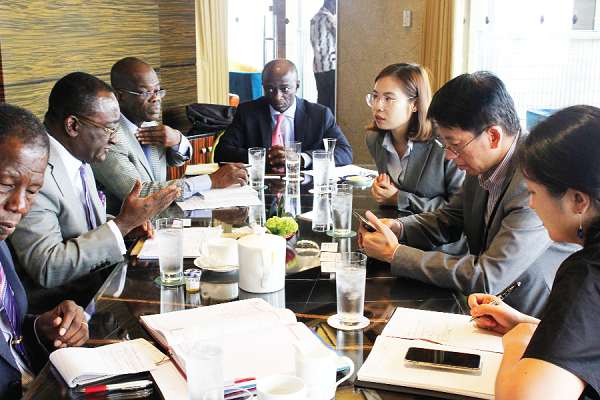A thirteen-member delegation, led by the Minister of Food and Agriculture (MOFA), Dr Owusu Afriyie Akoto, was in China to explore the possibilities of entering into the Chinese market with Ghanaian products.
The delegation also sought partnerships with Chinese counterparts to invest in the various sectors of the economy of Ghana.
Additionally, it explored partnership in the cotton, cocoa products, the shea nut processing and fertiliser production as well as other areas of common interest.
Delegation
Other members of the delegation were the Technical Advisor to the minister, Mr Emmanuel Asante Krobea, Ghana’s Ambassador to China, Mr Edward Boateng, the Chief Executive of the COCOBOD, Mr Joseph Boahen Aidoo, the Chief Executive of the Ghana Cotton Development Authority, Mr James W. B. Yesseh, the Managing Director of the Cocoa Processing Company (CPC), Nana Agyenim Boateng, the Chief Executive Officer of the Cocoa Marketing Company (CMC), Dr Mensah Aborampah.
Chinese Chamber of Commerce
During a meeting with the Vice-Chairman of the Chinese Chamber of Commerce for Import and Export Textile and Apparel, Mr Zhang Xi-An, Dr Akoto explained that he was liaising with the chamber to get Chinese companies interested in the cotton industry to consider investing in the production, processing and marketing of the cotton both locally and into the Chinese and other African markets.
He told Mr Xi-An that the government had a discussion with two Chinese companies two years ago for the possibility of setting up a cotton processing facility in Ghana.
Dr Akoto, who said the discussion with the two companies began during the President Mahama-led administration, explained that when he took over the ministry, “I felt that this is an important project and, therefore, decided to re-establish communications between Ghana and the chamber.”
He said he followed up with an invitation of the representatives of the two companies to Ghana who, during the meeting, reminded the ministry that there was already a memorandum of understanding (MoU) between them and the ministry.
Dr Akoto said the government of Ghana had set aside 100,000 hectares of land for cotton production in the northern part of Ghana as a way of revamping the cotton industry.
He, therefore, invited the Chinese investors, especially those in the cotton industry, to take advantage of the opportunity to invest in the sector from the farm to garments, to feed the local market and the international market as well.
How cotton is produced in Ghana
The Chief Executive Officer of the Cotton Development Authority, Mr Yesseh, took members of the chamber through how the cotton was produced and used in Ghana.
He said currently what pertained in the cotton production was that small-scale farmers interested in farming cotton were supported by interested cotton companies with improved seeds, fertilisers and other resources.
Mr Yesseh added that when the farmers produced the cotton, it was sold to the cotton companies which in turn processed it, sold some to the local textile industry and exported some.
Commercialising cotton production
“But now, we want to modify the system to make sure that we do commercial farming,” he explained, adding that what Ghana was looking forward to attract Chinese companies to establish a plant in the country to process the cotton and also manufacture garments.
Mr Yesseh explained that the idea was to make cotton production viable and more commercial than what was going on currently in order to revamp the industry.
Chinese business community excited
Mr Xi-An expressed excitement with the decision by Ghana to redirect its attention to Chinese companies, explaining that his association was directly in charge with the production, manufacturing and marketing of garments in China.
He said the association was expanding its activities outside the South Asian countries to African countries and Ghana, where he described as potential ground for cotton production.
Mr Xi-An pledged to mobilise Chinese businesses to explore the possibilities of investing in Ghana through the association, adding that the association, which was already operating in some African countries, was glad to include Ghana.

